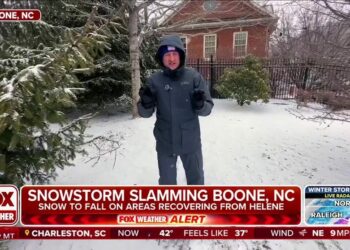It’s time now for a fact-check of North Carolina politics. Immigration and border security have taken center stage in this year’s election with Republican candidates criticizing the border policy of President Joe Biden and Democrats. Though North Carolina is about 1,000 miles from the southern border, some lawmakers want to make it an issue here.
In a letter to Gov. Roy Cooper earlier this year, members of the Republican-controlled North Carolina House wrote that North Carolina “faces increased security threats from foreign actors, tragic fentanyl deaths and disturbing human trafficking by cartels and gangs.” The letter goes on to say that these alleged threats are diverting resources to the detriment of North Carolina citizens. Paul Specht, of WRAL, joins me now for a closer look.
Marshall Terry: OK. So, the letter claims immigrants here illegally are causing increased criminal activity in North Carolina. Is there data to back that up?
Paul Specht: Right now there’s not. And one thing to know, just about tracking criminal activity is that it usually lags. The most recent data we have from the SBI, the State Bureau of Investigation, is from 2022. But over the years — since the pandemic, I should say — criminal activity, especially violent crime, has been going down. And so criminal analysts that we spoke to say that if immigrants, non-citizens who are crossing the border and coming to North Carolina, if they were driving a surge in crime, we would see that in the overall numbers and we’re not, at least not so far.
Terry: Now, what about fentanyl deaths? Is there any link between that happening in North Carolina and what’s going on at the border?
Specht: There is, but perhaps not in the way that many people assume. Some politicians have talked about the open border contributing to fentanyl deaths in North Carolina. Now, first and foremost, we have seen fentanyl deaths skyrocket in recent years, and that’s because it’s a synthetic opioid. It’s hard to detect. A lot of people overdose on it because they don’t understand its potency, or they don’t know it’s in the drug that they’re using. So that is a real issue, and I don’t want to downplay that.
What I do want to point out, though, is that criminal experts and people who track immigration and stuff like this, they say that most of the fentanyl is not being carried on the backs of migrants across the border, across the Rio Grande. It’s actually coming in cargo trucks that go through the normal U.S. ports of entry, and it’s called smuggling for a reason. They’re hiding it, and they’re able to get it across [the border] and then distribute it to local gangs who then sell it on the streets.
So one more stat to keep in mind: 86% of the people who have been charged with trafficking fentanyl in United States are U.S. citizens. So when it comes to fentanyl trafficking, that’s mostly done by U.S. citizens. Again, the fentanyl itself does come from Mexico, but typically is not being carried by migrants who are crossing the border over the wall, under the wall, through the desert and things like that.
Terry: In that letter to the governor, Republicans also said resources are being diverted away from North Carolina citizens. Is there any truth to that?
Specht: I’m sure they could argue that any time a non-citizen is picked up on the street for a crime, that’s money you have to pay a police officer to take them to jail. But when we look at the bigger picture, when we look at say, unemployment and Medicaid — those are two big government services that taxpayer dollars pay for and that some non-citizens can apply for. So with that in mind, we looked at the Medicaid benefits over the years to see is this something that more non-citizens are signing up for?
Well, come to find out non-citizens account for about 2% of North Carolina’s Medicaid enrollees, 2.9 million North Carolinians are enrolled. And when we look at unemployment and look at that number — again, 2% of the people applying for unemployment benefits are non-citizens. And that’s down from previous years. Obviously, it was really high during the pandemic and then has been coming down from 4% to 2% in recent years.
So the narrative that non-citizens or people coming across the border are straining government services just doesn’t show up in the data.
Terry: Former President Trump and other Republicans have claimed immigrants are influencing elections. Is there any evidence of that happening in North Carolina?
Specht: No. Non-citizens are not allowed to vote in North Carolina and many other states. There have been a few cases where they did and were caught. Going back to the 2016 election, there were 19 noncitizens who voted, 16 people pleaded guilty — mostly to misdemeanors. Oftentimes, when non-citizens vote it’s because they don’t understand what their legal limitations are. And then three of those 19 cases were dismissed.
It’s happened here and there since then. There was — the elections board found three other cases, one in 2018, one in 2020, one in 2021. And none of these wrongful votes, if you will, would’ve swung an election one way or another.
Terry: All right. So, big picture here: Is North Carolina being overwhelmed by non-citizens?
Specht: It does not show up in our government records when it comes to schools, when it comes to crime, when it comes to unemployment, Medicaid, or other services that the government provides. We checked the data that’s public, and that narrative just doesn’t bear out.
Source link : http://www.bing.com/news/apiclick.aspx?ref=FexRss&aid=&tid=66ea4d4110f54e0cae2cfe513516719d&url=https%3A%2F%2Fwww.wfae.org%2Fpolitics%2F2024-09-17%2Ffact-check-is-north-carolina-being-overwhelmed-by-non-citizens&c=3089812711332440821&mkt=en-us
Author :
Publish date : 2024-09-17 14:13:00
Copyright for syndicated content belongs to the linked Source.







